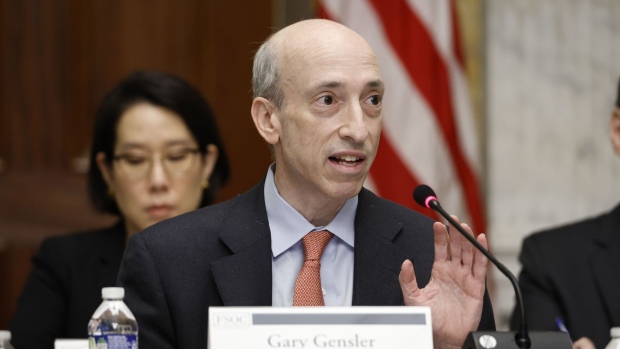Dec 22, 2022
SEC’s Crypto Crackdown Is Just Getting Started After FTX Blowup
, Bloomberg News

(Bloomberg) -- The US Securities and Exchange Commission is just getting started with its crackdown on crypto firms that refuse to abide by its rules.
SEC Chair Gary Gensler said in an interview on Thursday that the agency’s patience is wearing thin for digital-asset exchanges and other firms that shirk its regulations. Just hours earlier, the watchdog - which had already filed a lawsuit against FTX co-founder Sam Bankman-Fried — sued two more prominent crypto executives for their alleged roles in the collapse of the digital-asset exchange.
“The runway is getting shorter” to start following rules and register with the agency, said Gensler. “The casinos in this Wild West are non-compliant intermediaries,” he added.
Although he declined to identify firms facing scrutiny, or comment on where the FTX probe may go next, Gensler warned about a number of practices that are rampant in the industry.
Over the past year and a half, the SEC chief has argued that most tokens are really just unregistered securities trading on the blockchain. He says they must follow the agency’s tough trading and investment rules.
Client Funds
Gensler chided platforms for not walling off the different parts of their business, such as custody and market-making functions. He also said client funds often aren’t being properly segregated — a problem that’s gained a lot of attention following the failure of FTX.
The SEC has accused former FTX chief executive officer Bankman-Fried and two of his former top associates — Caroline Ellison and Gary Wang — of participating in a multi-year scheme to defraud investors by falsely touting the exchange as a safe platform, while at the same time diverting customer funds to trading firm Alameda Research and concealing other risks and problems.
On Thursday, Gensler also took issue with so-called proof-of-reserves reports, which some crypto firms publish to prove they have enough funds on hand to back customer deposits. Gensler said the practice, which has been used by major crypto firms including Binance Holdings Ltd., falls short of the disclosures needed to protect investors.
“Proof of reserves is neither a full accounting of the assets and liability of a company, nor does it satisfy segregation of customer funds under the securities laws,” Gensler said.
More broadly, the SEC chief signaled that regulators remain focused on crypto firms’ financial record keeping.
“There are some in this field that have talked about ways to give customers confidence that their crypto is really there,” Gensler said, without referencing any specific firm. “They should do that by coming into compliance with time-tested custody, segregation of customer funds rules and accounting rules.”
©2022 Bloomberg L.P.





